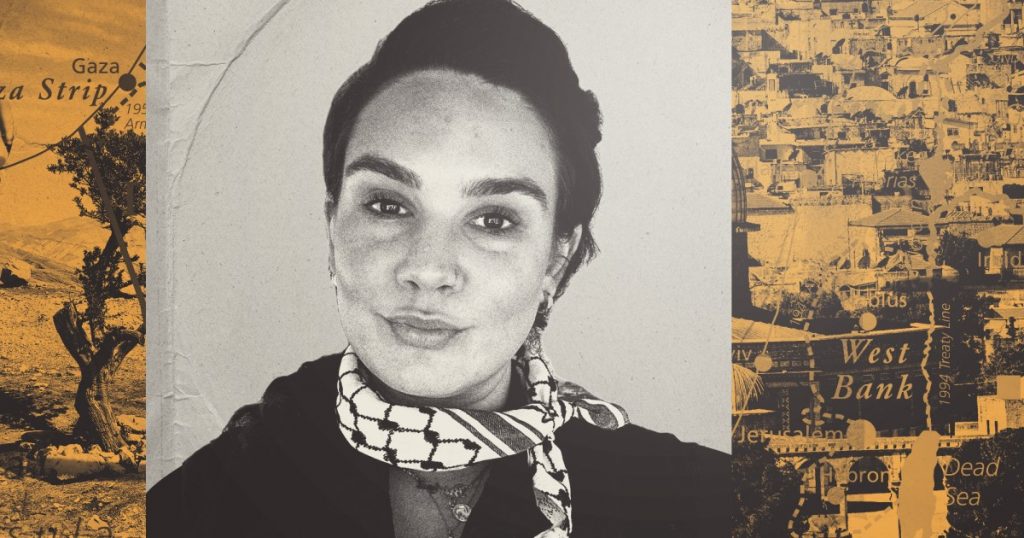A Nurse on the Scene Inside Rafah’s Last Maternity Hospital
Mother Jones; Getty; photo courtesy of Bridget Rochios
Fight disinformation: Sign up for the free Mother Jones Daily newsletter and follow the news that matters.At the last maternity and neonatal hospital in Rafah, the devastation has already arrived. “There is no safe place in Gaza from a healthcare perspective—and beyond,” Bridget Rochios, a certified nurse-midwife from California volunteering at Al-Helal Al-Emirati Maternity Hospital, told me.
As Israel prepares a ground invasion of Rafah, Rochios—who is working with the Canadian healthcare organization Gila and talked to me by told me by phone on Thursday afternoon—says the hospital has seen a massive influx of patients. It is running low on the most basic supplies like gloves and scissors. Humanitarian experts have warned of catastrophic consequences if Israel does invade Rafah. In a statement Sunday, Natalia Kanem, executive director of the United Nations Population Fund, said that “an attack in Rafah could turn [Al-Emirati Hospital] and other health facilities from places of hope into rubble and dust.”
American and Israeli officials, meanwhile, have traded barbs. President Biden told CNN on Wednesday that he will stop shipping certain weapons to Israel if Prime Minister Benjamin Netanyahu proceeds with a major ground invasion of Rafah. “I made it clear that if they go into Rafah…I’m not supplying the weapons,” Biden told CNN’s Erin Burnett. White House Spokesperson John Kirby added Thursday that Biden does not believe “smashing into Rafah” will help take out Hamas. Netanyahu seemed to fire back at Biden’s threats, saying, “if Israel is forced to stand alone, Israel will stand alone.”
But Rochios wants the world to know the impact of the war on Gaza’s children: “The bombing and shelling is incessant. It is happening. And there’s nowhere else to go.” That means the lives of 50 newborns in the hospital’s intensive care hang in the balance: if the hospital is ordered to evacuate, none of those babies would survive transportation, Rochios said.
I spoke with her about daily life at the hospital under the bombardment.
This interview has been lightly condensed and edited.
Can you say more about how an invasion of Rafah will affect births in Gaza?
What birth has looked like since October has been chaotic and disrespectful. And it’s not for a lack of effort on the side of health care workers in Palestine—but because of an almost 20-year blockade that already limited resources and the further limitation from the block of supplies and aid by the Israeli military right now.
With over a million displaced people in Rafah, the hospital has had to kind of expand out of nowhere in order to support all of the births. Prior to October, there was about 70 births a month. And most recently, there have been like 80, 85 births a day.
What is happening now is that the Israeli military is attacking Rafah, and women are confused about where to go to seek care. Historically, given how violence has happened within hospitals, people are afraid to go to hospitals. People are being redirected back to areas like Khan Yunis, where hospital infrastructure has been obliterated, if not severely damaged. So a threat of further invasion of Rafah means the complete end of healthcare in Gaza, and in this context, for birthing people and their newborns.
Are you thinking of the worst-case scenario, that the hospital could be obliterated, or are you talking about the fact that even if the building remains safe and secure, you’re already dealing with the blockade and that makes the work impossible?
Both. So if the invasion continues into Rafah, the Ministry of Health is going to evacuate Emirati Hospital. And although there are field clinics sprouting up, no place has the capacity, infrastructure, manpower, and resources to meet the healthcare needs of pregnant and birthing people and of newborns. And the Rafah border crossing was the way that medical supplies, medications, equipment, and aid workers were getting into Gaza. With the loss of that, that gateway into Gaza, we have no idea how more supplies will be getting in, or how aid workers will be getting in and out, how medical evacuations will happen for people who need it.
Who’s being served at the hospital right now—how many babies and pregnant people are there?
There’s up to 15 C-sections that happen a day, up to 70 vaginal deliveries that happen a day, and many others who are being triaged and evaluated. It’s important to remember that women in Gaza are not receiving any prenatal care, so coming into the maternity emergency room is where they’re getting any sort of care or evaluation.
Today in the hospital, volume was less and the amount of workers was less; so many of the healthcare workers who were at Emirati were also displaced people. Throughout the week I have seen people have to leave in the middle of their shift because they found out there’s an evacuation and they need to figure out where to go. There’s a dwindling amount of people who can provide care to women here.
Bridget, a midwife from California, is inside Rafah’s last remaining maternity hospital. She’s witnessing the effects of the brutal attack on Rafah, the Israeli occupation, and ongoing genocide against birthing people, newborns and children #AllEyesOnRafah pic.twitter.com/gKt8MNu7tQ
— The Glia Project (@Glia_Intl) May 8, 2024
Is there a neonatal intensive care unit (NICU)?
There is a NICU. Unfortunately, if evacuation is required, there are not the resources, capacity, or supplies to continue the life-saving interventions for those babies and they would die in transport or would not be able to be received at the next health stop.
What medical supplies are you running dangerously low on?
Everything. There has at this point been access to basic things, which has been great. I brought in a lot of my own personal supplies, too. But with this blockade of Rafah crossing, unless it reopens this will be an incredibly dire situation where medication, tools, everything, antibiotics in particular—anything that a Mom needs will not be available.
Today, a negotiation of mine was, like: What I’m going to use gloves for? Birth is kind of a messy thing. There’s amniotic fluid, there’s blood, there’s feces. One way that you make sure that a woman is staying healthy and birthing with dignity is by changing the pads underneath her and making sure that the environment is clean. We don’t have enough pads…when it would never be a second thought in the United States.
And that is just around cleanliness. I don’t always have scissors to cut an umbilical cord with.
What do you do in those moments?
We use a razor blade, which is not the safest.
The system is just overwhelmed.
What about pain medication for labor?
In Rafah, there is spinal anesthesia—like an epidural, essentially—for C-sections, but there’s no pain medication available for vaginal births.
What does birth now look like for those women who are going without pain medication?
When women don’t have pain medication, they need a huge amount of support. And when that much birth is happening, where does that exist? Where does any physical or emotional support exist? A big part of birth too, is really feeling safe. That’s what allows birth to happen—is knowing that you’re safe. Hormonally, it’s hard for our bodies even to go into labor when there is a sign of fear. But how comfortable or safe can you feel in a tent in the middle of a genocide?
In the US, women—at a minimum—stay 24 hours postpartum to be observed to watch for hemorrhage, to watch for gestational hypertension, to make sure that breastfeeding is going well. But because of high volume in Rafah, women are discharged from the hospital at a maximum six hours after delivery, and those are for people who’ve actually experienced complications in labor. There’s zero postpartum oversight just as there is zero prenatal care.
The breastfeeding that is happening for infants is way smaller than it should be. You need a lot of calories and a lot of clean water and a lot of rest in order to produce breast milk. And none of those things exist here.
How does the situation right now and the feeling in the hospital right now compare to when you arrived?
The vibe has totally changed. Morale is low. People are really afraid about what’s going on. We’ve seen what has happened systematically to the health care systems throughout Gaza. So everybody’s kind of waiting with bated breath, and everybody’s absolutely exhausted, and that goes for patients and staff alike.
How are you feeling? Can you talk about what it’s like to try to provide care in the circumstances that you’re working in?
It’s an incredibly devastating situation. Women and pregnant people, birthing people, deserve the utmost amount of dignity, respect, care, and attention when they are going through such an important life transition, as do their babies. And it is not for a lack of effort on behalf of the health care workers here who are valiant and hardworking and so exhausted.
It is just incredibly devastating to see very simple, life saving procedures that can be done in Gaza, but there’s no capacity resource for it because of this war. To see newborns die because they don’t have these surgeries. Knowing they would easily be able to live if we were not under these conditions. It is really upsetting to see mothers who’ve experienced so much loss. These babies have grown inside of them. And now they are giving birth to the background noise of machine guns going off and bombs dropping.
It’s traumatic and there’s not one person here who I have interacted with who has not been heavily affected by what’s going on.





